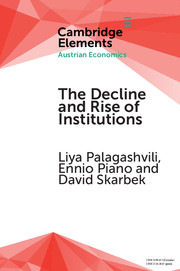Element contents
The Decline and Rise of Institutions
Published online by Cambridge University Press: 09 August 2017
Summary
Keywords
- Type
- Element
- Information
- Series: Elements in Austrian EconomicsOnline ISBN: 9781108186179Publisher: Cambridge University PressPrint publication: 31 August 2017
References
- 23
- Cited by

